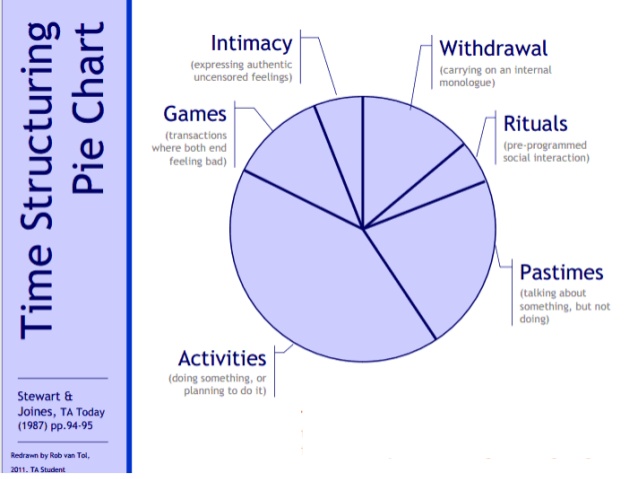Time Structuring
I liked this framework and article from Relationships explained.com about how we spend time with ourselves and other people using time structuring theory in Transactional Analysis.
Time structuring is piece of theory which allows us to think about how intensely we  spend time with other people. Eric Berne, the founder of Transactional Analysis, believed that human beings need to structure time and relationships with other people in some way.
spend time with other people. Eric Berne, the founder of Transactional Analysis, believed that human beings need to structure time and relationships with other people in some way.
He assumed that we have an inbuilt drive to create structure out of chaos in relationships, just like our brain organizes sensory input in terms of objects and meaningful categories. He suggested six possible ways that people might structure their time and relationships: withdrawal, rituals, pastimes, activities, psychological games, and intimacy.
The order of the possible patterns is important. The emotional intensity in our relationships increases step-by-step as we move from withdrawal to intimacy. While we may feel lonely and unstimulated by withdrawal, we move to a highly charged and emotionally open state when we’re intimate with another person (also have a look at psychological hungers in relationships for a discussion on intimacy).
However, by the same token, the emotional risk increases when we move from withdrawal to intimacy. During withdrawal we are emotionally very safe, and no-one can hurt as we are not in contact with anyone. When we are intimate with another person we open ourselves to the other and whatever they bring into the encounter, good or bad. Unfortunately, a lot of us needed to learn how to protect themselves in relationships as children, which limits our capacity to be emotionally close as adults (see script).
We therefore tend to spend less time in intimate encounters and more time in safer social situations than is perhaps good for us, since our relationships become superficial and empty of real attachment or investment, and so fail to nourish or stimulate us. However, we all need time in each one of the different social situations: for example, we need time to withdraw and be with ourselves. Or, when we get to know somebody new, we may want to spend some time just “pastiming”, either because we don’t feel safe yet with the other person or because we don’t actually want to get to know them any better.
Here’s some more information about the different ways it’s possible to spend time with people:
Withdrawal
 Withdrawal is spending time out of contact or out of relationship. Some people will physically withdraw and be on their own.
Withdrawal is spending time out of contact or out of relationship. Some people will physically withdraw and be on their own.
Other people withdraw on the inside and are physically present, but emotionally absent. However, we all need time to be with ourselves and regroup, so some withdrawal time is necessary for all of us.
Rituals
These are highly structured and stylised ways of interacting. For example, a greeting like “Hello, how are you?” and a response of “Thanks, very well, and how are you?” is a ritual. Two people are interacting, albeit in a very structured and pre-programmed way.
 The good thing about rituals is that they give us a lot of structure and security and a possible way in to more intense contact. On the downside, they contain little emotional value: you could exchange hellos with a complete stranger without much, if any, emotional contact.
The good thing about rituals is that they give us a lot of structure and security and a possible way in to more intense contact. On the downside, they contain little emotional value: you could exchange hellos with a complete stranger without much, if any, emotional contact.
Pastimes
This is the dinner party level of interaction. Here we make polite and easy conversation and there are culturally agreed topics we can talk about, knowing we won’t get into hairy situations with our partners in the exchanges. In Britain we might talk about the weather or the food or your last holiday, but you certainly wouldn’t start talking about the difficulties you are having with your partner or your mother.
There is a bit more of an exchange involved, but it’s still pretty safe, because both parties will avoid any controversial or painful topics. This level of interaction fits with casual acquaintances and people you have only just met. It might be amusing for a while, but most people will get quite bored with it rather sooner than later.
Activity
This is probably where many of us spend a lot of time with others. Activity stands for “goal directed activity” with others, say attending a meeting or playing tennis. It is time we spend doing things with others, rather than just being with them.
 Activity may include work, or at home it could involve running a household or looking after the children. It’s shared time, and may include having a lot of fun, but it may also mean we are avoiding really being with the other and meeting them fully.
Activity may include work, or at home it could involve running a household or looking after the children. It’s shared time, and may include having a lot of fun, but it may also mean we are avoiding really being with the other and meeting them fully.
Psychological Games
This is a chapter in itself! You can read more on games, if you haven’t already done so, under the section games. In short, games are a sequence of interactions with others which involve a hidden agenda and which end up with both parties experiencing familiar bad feelings.
Games can be seen as a failed attempt to be intimate with another person. However, both parties do not take the full risk of being open and authentic with each other and the result is a repetitive pattern of interacting from set roles.
Intimacy
This is an authentic encounter with another, a moment of shared openness, trust and honesty. Intimacy means emotionally intimate, not necessarily sexually intimate (unfortunately, a lot of sex isn’t necessarily emotionally intimate). It also doesn’t necessarily mean nice and peaceful.
An intimate encounter may be an angry argument, but conducted from a place of respect and openness to one’s own feelings and those of the other(s). Intimacy gives us the highest level of emotional intensity, but also involves taking the greatest risks (one could be rejected or ridiculed when showing one’s true self and being open – something that most people would find emotionally very painful).
In a lot of our relationships it’s the moments of emotional intimacy that are missing and which are so important to us all. Intimacy means attachment and letting somebody into one’s heart and soul. It means we are allowing the other person to impact us and change us. If relationships don’t work it is often, maybe even always, caused by lack of shared intimate time.
 If you want to know more about how to apply the concept of time structuring to your life and your relationship, have a look at applying time structuring.
If you want to know more about how to apply the concept of time structuring to your life and your relationship, have a look at applying time structuring.